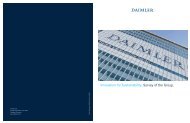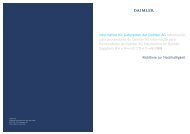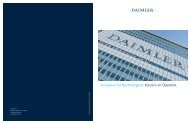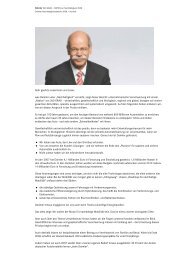Dear readers, This report describes what Daimler means by ...
Dear readers, This report describes what Daimler means by ...
Dear readers, This report describes what Daimler means by ...
You also want an ePaper? Increase the reach of your titles
YUMPU automatically turns print PDFs into web optimized ePapers that Google loves.
<strong>Daimler</strong> 360 GRAD - FAKTEN zur Nachhaltigkeit 2008<br />
<strong>Daimler</strong> Nachhaltigkeitsbericht 2008 / Environmental protection, innovation, and safety / Innovation, development and safety / Fuels for the future<br />
Fuels for the future: New fuels will replace<br />
fossil fuels<br />
High-quality and alternative fuels represent a further component in the effort to achieve an optimal<br />
environmental balance for the overall drive system. Our path to the fuel of the future will take us from clean<br />
conventional fuels to second-generation synthetic biofuels and the use of hydrogen to power fuel cell drive<br />
systems.<br />
Bioethanol and biodiesel as additives. The current practice of blending fossil fuels and crop-derived fuels such as<br />
ethanol and biodiesel is already helping to enhance the environmental balance sheet for road traffic. <strong>Daimler</strong> has<br />
committed itself to supporting activities that exploit the potential of biofuels more consistently than has<br />
previously been the case. More specifically, <strong>Daimler</strong> is committed to creating technologies which ensure that<br />
vehicles can run on fuels with up to 10 percent of biofuel admixtures. All of the gasoline engines in our current<br />
Mercedes-Benz and smart models are already suitable for operation with biogenic fuels containing up to 10<br />
percent ethanol (E10). Plans call for such fuels to be introduced in Germany in mid-2008. By far the majority of<br />
all older Mercedes-Benz and smart models can also run on E10 fuel. Excluded here are vehicles with firstgeneration<br />
four-cylinder gasoline direct injection engines from the years 2002–2005. Also excluded are models<br />
produced ex works without a three-way catalytic converter, or with a carburetor. These vehicles are generally<br />
more than 23 years old.<br />
Biomass-to-liquid (BTL) – the second, latest generation of biofuels. The testing of Mercedes-Benz diesel engines<br />
has shown that switching to synthetic fuels such as BTL would reduce particulate emissions <strong>by</strong> as much as 30<br />
percent and cut emissions of carbon monoxide and hydrocarbons <strong>by</strong> up to 90 percent. BTL fuels are<br />
manufactured through the gasification of all types of biogenic waste materials, which <strong>means</strong> that their<br />
production does not compete with food crop cultivation. BTL fuels can also be used with all current and future<br />
diesel engines without any need for retrofitting.<br />
<strong>Daimler</strong> and Volkswagen have been shareholders in CHOREN Industries GmbH in Freiberg, Germany, since<br />
October 2007. CHOREN is pursuing the market introduction of climate-friendly second-generation synthetic<br />
biofuels produced through gasification. CHOREN developed SunDiesel ® fuel, which has a high cetane number<br />
and thus delivers much better ignition performance than conventional diesel. SunDiesel ® is completely free of<br />
sulfur and aromatics and significantly reduces pollutant emissions. SunDiesel ® can also be used without any<br />
adjustment of existing infrastructure or engine systems, and the fuel is largely CO 2 -neutral as well. The<br />
environmental “balance sheet” of SunDiesel shows that, compared to conventional fuels, as much as 90 percent<br />
of CO 2 emissions can be prevented along the entire BTL value chain comprising cultivation, fuel production, and<br />
use. Mercedes-Benz intends to fill the tanks of all new diesel vehicles leaving its production plants with<br />
SunDiesel ® as soon as an adequate supply of the fuel is available.<br />
CHOREN commissioned the world’s first commercially operated BTL production facility in April 2008. When it<br />
reaches full capacity, the plant, which is located in the German state of Saxony, will produce 18 million liters of<br />
BTL fuel per year. That’s enough to fill the tanks of 15,000 passenger cars. A second facility with an annual<br />
capacity of 250 million liters is now being planned.<br />
Hydrogen – the fuel of the future. Before the fuel cell drive can be brought to market, progress has to be made<br />
regarding the production of hydrogen from renewable sources and the establishment of a suitable hydrogen<br />
supply infrastructure. Both of these tasks call for extensive cooperation between governments, the oil industry,<br />
the energy sector, and other potential investors. In order to promote such an effort, <strong>Daimler</strong> is taking part in the<br />
Clean Energy Partnership (CEP) in Europe.














